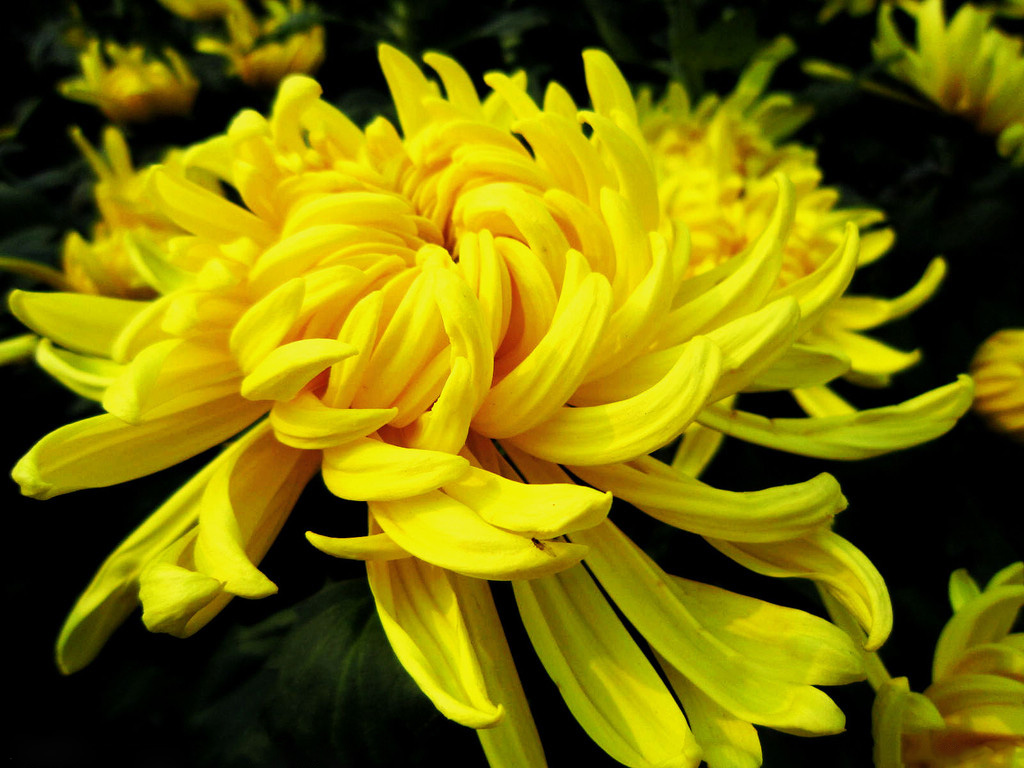用threejs和ammojs制作有体积的柔体
三维空间中的物体,从简单到复杂,依次是点、线、面、体。柔体的线和面都已经完成,接下来,就要制作体。
- bullet引擎和OpenGL结合创建简单的场景
- three.js和ammo.js创建简单的场景
- 创建地形
- 制作车辆
- 柔体-绳索
- 柔体-布料
- 柔体-有体积的柔体
- 使用blender引擎模拟物理场景
有体积的柔体场景
本节目标:在空间中生成两个带体积的柔体,一个球,一个长方体。
和布料相同,复制一份绳索场景作为工作的模板,不过这次要先把绳索和支架相关的部分先删干净。
需要的全局变量
添加三个全局变量
var softBodySolver;
var softBodies = [];
var softBodyHelpers = new Ammo.btSoftBodyHelpers();
说明:softBodies数组用来保存柔体,和rigidBodies作用相同。把softBodyHelpers提取出来也是因为柔体不止一个。
创建柔体的函数createSoftVolume
该过程非常复杂,相比绳索和布料复杂的多得多。我们接下来创建一系列辅助函数。为了内存使用的高效,要把顶点的xyz坐标展开后依次放入一个数组,所以需要一个索引标记每个向量开始的位置。
1. isEqual
//fun1 判断误差范围内两向量相等的函数
function isEqual(x1, y1, z1, x2, y2, z2) {
var delta = 0.000001;
return Math.abs(x1 - x2) < delta &&
Math.abs(y1 - y2) < delta &&
Math.abs(z1 - z2) < delta;
}
因为bullet引擎迭代次数有限,所以运算前后bufferGeom和indexedBufferGeom坐标可能会有误差,这个函数用来关联顶点坐标和纹理坐标
2. createIndexedBufferGeometryFromGeometry
function createIndexedBufferGeometryFromGeometry(geometry) {
var numVertices = geometry.vertices.length;
var numFaces = geometry.faces.length;
var bufferGeom = new THREE.BufferGeometry();
var vertices = new Float32Array(numVertices * 3);
var indices = new ( numFaces * 3 > 65535 ? Uint32Array : Uint16Array )(numFaces * 3);
for (var i = 0; i < numVertices; i++) {
var p = geometry.vertices[i];
var i3 = i * 3;
vertices[i3] = p.x;
vertices[i3 + 1] = p.y;
vertices[i3 + 2] = p.z;
}
for (var i = 0; i < numFaces; i++) {
var f = geometry.faces[i];
var i3 = i * 3;
indices[i3] = f.a;
indices[i3 + 1] = f.b;
indices[i3 + 2] = f.c;
}
bufferGeom.setIndex(new THREE.BufferAttribute(indices, 1));
bufferGeom.addAttribute('position', new THREE.BufferAttribute(vertices, 3));
return bufferGeom;
}
addAttribute用来设置顶点着色器的position属性,顶点为了正确渲染到屏幕上,需要经过MVP变换,具体可以参考计算机图形学不赘述。postion属性就是模型点在模型局部空间内的相对位置。
3. mapIndices
function mapIndices(bufGeometry, indexedBufferGeom) {
// Creates ammoVertices, ammoIndices and ammoIndexAssociation in bufGeometry
var vertices = bufGeometry.attributes.position.array;
var idxVertices = indexedBufferGeom.attributes.position.array;
var indices = indexedBufferGeom.index.array;
var numIdxVertices = idxVertices.length / 3;
var numVertices = vertices.length / 3;
bufGeometry.ammoVertices = idxVertices;
bufGeometry.ammoIndices = indices;
bufGeometry.ammoIndexAssociation = [];
for (var i = 0; i < numIdxVertices; i++) {
var association = [];
bufGeometry.ammoIndexAssociation.push(association);
var i3 = i * 3;
for (var j = 0; j < numVertices; j++) {
var j3 = j * 3;
if (isEqual(idxVertices[i3], idxVertices[i3 + 1], idxVertices[i3 + 2],
vertices[j3], vertices[j3 + 1], vertices[j3 + 2])) {
association.push(j3);
}
}
}
}
ammoIndexAssociation[i]表示数组中第i个向量开始的位置。
4. processGeometry
function processGeometry(bufGeometry) {
// Obtain a Geometry
// var geometry = new THREE.Geometry().fromBufferGeometry(bufGeometry);
var geometry = new THREE.Geometry().fromBufferGeometry( bufGeometry );
// Merge the vertices so the triangle soup is converted to indexed triangles
// var vertsDiff = geometry.mergeVertices();
geometry.mergeVertices();
// Convert again to BufferGeometry, indexed
var indexedBufferGeom = createIndexedBufferGeometryFromGeometry(geometry);
// Create index arrays mapping the indexed vertices to bufGeometry vertices
mapIndices(bufGeometry, indexedBufferGeom);
}
mergeVertices函数是THREE.Geometry()的一个功能,可以优化物体的顶点和索引,使之渲染性能更好。
5. createSoftVolume
function createSoftVolume(bufferGeom, mass, pressure) {
processGeometry(bufferGeom);
// 渲染空间中的柔体
var volume = new THREE.Mesh(bufferGeom, new THREE.MeshPhongMaterial({color: 0x00EE00}));
volume.castShadow = true;
volume.receiveShadow = true;
volume.frustumCulled = false;
scene.add(volume);
// 物理空间中的柔体
var volumeSoftBody = softBodyHelpers.CreateFromTriMesh(
physicsWorld.getWorldInfo(),
bufferGeom.ammoVertices,
bufferGeom.ammoIndices,
bufferGeom.ammoIndices.length / 3,
true);
var sbConfig = volumeSoftBody.get_m_cfg();
sbConfig.set_viterations(40);
sbConfig.set_piterations(40);
// Soft-soft and soft-rigid collisions
sbConfig.set_collisions(0x11);
// Friction 摩擦因数
sbConfig.set_kDF(0.1);
// Damping 阻尼
sbConfig.set_kDP(0.01);
// Pressure 压力
sbConfig.set_kPR(pressure);
// Stiffness 强度
volumeSoftBody.get_m_materials().at(0).set_m_kLST(0.9);
volumeSoftBody.get_m_materials().at(0).set_m_kAST(0.9);
// Soft-soft and soft-rigid collisions
sbConfig.set_collisions(0x11);
volumeSoftBody.setTotalMass(mass, false);
Ammo.castObject(volumeSoftBody, Ammo.btCollisionObject).getCollisionShape().setMargin(margin);
physicsWorld.addSoftBody(volumeSoftBody, 1, -1);
volume.userData.physicsBody = volumeSoftBody;
// Disable deactivation
// Ammo.DISABLE_DEACTIVATION = 4
volumeSoftBody.setActivationState(4);
softBodies.push(volume);
}
createSoftVolume和创建车辆系统很类似,要配置大量物理状态。
修改createObjects函数
在场景中保留砖墙,去掉绳索和小球,添加一个坡道和两个柔体,两个柔体一个球一个长方体。
// 创建坡道
pos.set(3, 1, 0);
quat.setFromAxisAngle(new THREE.Vector3(0, 0, 1), 30 * Math.PI / 180);
var obstacle = createParallellepiped(10, 1, 4, 0, pos, quat, new THREE.MeshPhongMaterial({color: 0x606060}));
obstacle.castShadow = true;
obstacle.receiveShadow = true;
// 创建拥有体积的柔体
var volumeMass = 15;
var sphereGeometry = new THREE.SphereBufferGeometry(1.5, 40, 25);
sphereGeometry.translate(5, 5, 0);
createSoftVolume(sphereGeometry, volumeMass, 250);
var boxGeometry = new THREE.BufferGeometry().fromGeometry(new THREE.BoxGeometry(1, 1, 5, 4, 4, 20));
boxGeometry.translate(-2, 5, 0);
createSoftVolume(boxGeometry, volumeMass, 120);
修改updatePhysics函数
在updatePhysics函数中添加:
// 更新柔体状态
for (var i = 0, iL = softBodies.length; i < iL; i++) {
var volume = softBodies[i];
var geometry = volume.geometry;
var softBody = volume.userData.physicsBody;
var volumePositions = geometry.attributes.position.array;
var volumeNormals = geometry.attributes.normal.array;
var association = geometry.ammoIndexAssociation;
var numVerts = association.length;
var nodes = softBody.get_m_nodes();
for (var j = 0; j < numVerts; j++) {
var node = nodes.at(j);
var nodePos = node.get_m_x();
var x = nodePos.x();
var y = nodePos.y();
var z = nodePos.z();
var nodeNormal = node.get_m_n();
var nx = nodeNormal.x();
var ny = nodeNormal.y();
var nz = nodeNormal.z();
var assocVertex = association[j];
for (var k = 0, kl = assocVertex.length; k < kl; k++) {
var indexVertex = assocVertex[k];
volumePositions[indexVertex] = x;
volumeNormals[indexVertex] = nx;
indexVertex++;
volumePositions[indexVertex] = y;
volumeNormals[indexVertex] = ny;
indexVertex++;
volumePositions[indexVertex] = z;
volumeNormals[indexVertex] = nz;
}
}
geometry.attributes.position.needsUpdate = true;
geometry.attributes.normal.needsUpdate = true;
}
到此为止,整个场景完全完成。该程序的完整源代码,运行效果。别忘了按鼠标可以发射小球。建议把发射小球的质量减小,如果柔体的前表面穿到了后表面之后,会发生各种奇怪的错误。柔体经常发生一些破面之类的问题,这是因为求解迭代次数过少导致。

